Guide to planting rowan in spring from A to Z
A garden plot or cottage should look aesthetically pleasing - beautiful fruit trees and shrubs serve as excellent decorations for the area. If difficulties often arise with apples and pears, then rowan is unpretentious. Any gardener can grow trees with red-yellow, elegant fruits; the main thing is to follow the planting dates and basic care recommendations.
How to plant rowan in open ground and care for it, we will consider further.
Planting rowan in spring
In spring, rowan trees are planted before sap flow begins. When planting at this time of year, the risk of the plant freezing is reduced., as sometimes happens in the fall. The young tree will have time to take root in the soil and will gain strength before winter. In spring, strong winds occur less often, which means that weak shoots will not break, and rodents at this time are not as active as in autumn.
Attention! When you can plant rowan - in spring or autumn, each gardener decides for himself. First of all, it is recommended to pay attention to the growing region, climatic conditions and soil conditions.
Spring planting also has its downsides.. For example, seedlings are more expensive in spring than in autumn. Summer residents have to constantly check the moisture level in the soil to ensure that the plants feel good. Often after winter there are not enough nutrients in the soil, so it is important to organize additional fertilizing.
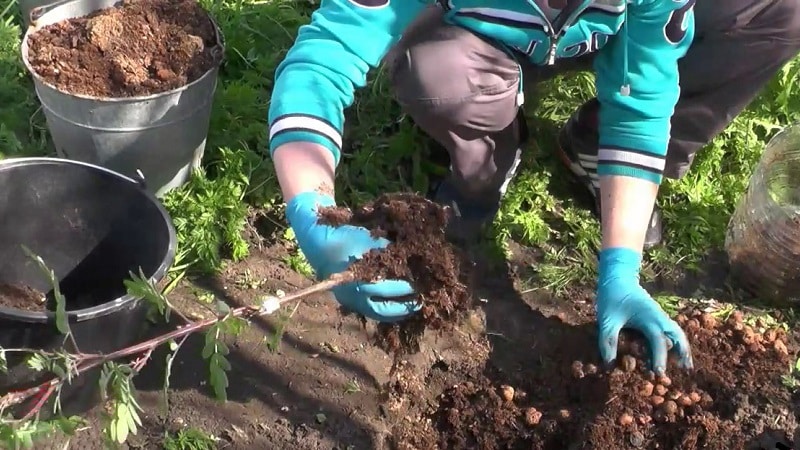
When to plant rowan in spring
Rowan berries are planted after the snow melts.. The recommended air temperature is about +7°C; at minus or zero temperatures, the seedlings will freeze. On the day of planting, the weather should be calm and without precipitation.
Some summer residents choose the date in accordance with the lunar calendar. The suitable month for the procedure is April; the optimal days fall on the waxing Moon. During the full or new moon, it is not recommended to plant fruit trees in the garden: it is believed that at this time the plants have weak vitality.
Choosing a landing site
Rowan is a frost-resistant and unpretentious plant., takes root on many types of soil, including sandy loam, loamy, mixed. Due to its high growth, places are allocated for the tree in the corners of the site or along the fence.
It is important that the adult plant does not obscure other garden crops. Rowan is planted at a distance of 4-5 m from other trees and tall shrubs. Choose a sunny or slightly shaded place; the location of the groundwater does not matter. Due to its decorative appearance, rowan is successfully used as a beautiful hedge.
Preparation of seedlings
Rowan seedlings are bought in specialized stores. They must be strong and elastic, with a moist root system consisting of 3-4 branches. The bark should be smooth, without wrinkles. If wrinkled areas are visible, it means the plant has been overdried.
Advice! During transportation, the roots of the seedlings are wrapped with a damp cloth.
Before planting, the roots are placed in a clay mash. It eliminates germs and bacteria and serves as an effective antiseptic. It is made from water, clay, mullein, water and ash. The roots are dipped in the mixture and placed in sawdust, which acts as mulch and retains moisture.Afterwards, the root system is wrapped in a thick plastic bag or burlap.
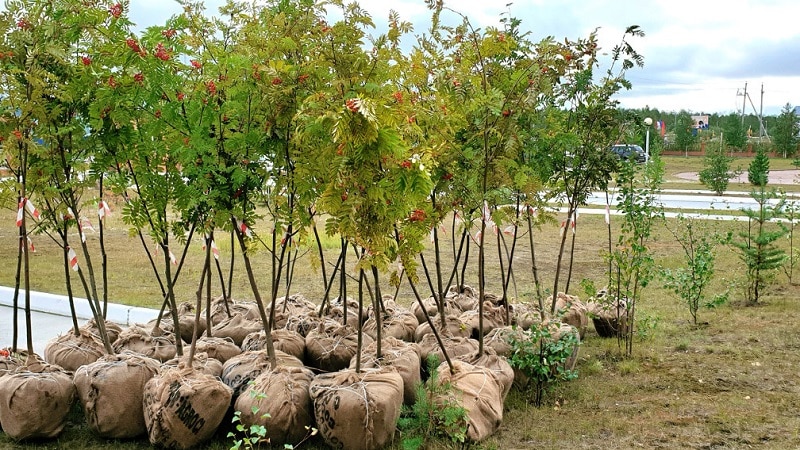
Soil preparation
How to fertilize garden soil before planting? For rowan, prepare sandy or loamy soil with a neutral reaction. A drainage layer made of expanded clay is welcome: it retains moisture and protects the rowan from insect pests. Before planting, the soil is fertilized: a bucket of compost, 150 g of superphosphate and 300 g of wood ash are added. If there are large clods in the ground, they are broken up with a shovel or rake. The planting site must be clean, free of weeds and last year's leaves.
Interesting things on the site:
How to plant rowan in spring
The pit is prepared 2-3 weeks before the planting date. The average depth is 70 cm, the diameter is equal to the size of the root system. On the day of planting, pour a bucket of water into the hole and wait until it is absorbed.
They take a seedling straighten the roots and place them in the recess so that the root collar is located at a distance of 5–7 cm above ground level. The soil is compacted around the plant and the base is sprinkled with mulch made from sawdust, peat or humus. The thickness of the layer is about 5–10 cm. When filling the hole, carefully shake off the tree so that no air pockets arise.
Planting scheme and neighboring crops
Rowan trees are planted singly or in small groups of 3-4 trees.. Several plants make a beautiful background for plantings of perennial shrubs. The distance between rowan and other crops should be at least 4 m. Otherwise, the plants will take nutrients from each other, which will cause the yield to suffer.
What to plant next to viburnum? It is not recommended to plant apple or pear trees nearby. Favorable neighbors for rowan are viburnum or barberry, coniferous trees and shrubs.
Nuances of planting depending on the growing region
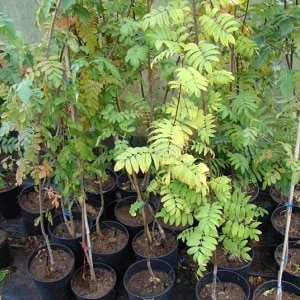 In areas with hot and long summers, the plant is planted in partial shade.. This will protect it from the scorching sun and improve its appearance. Otherwise, moistening the rowan will take 2-3 times more water than under normal conditions, and if there is a lack of moisture, the leaves will be dry and the fruits will be small.
In areas with hot and long summers, the plant is planted in partial shade.. This will protect it from the scorching sun and improve its appearance. Otherwise, moistening the rowan will take 2-3 times more water than under normal conditions, and if there is a lack of moisture, the leaves will be dry and the fruits will be small.
If the tree is grown in the northern regions (in the Urals and Siberia), special attention is paid to the place of cultivation and soil preparation. To improve its quality, complex fertilizing is applied to the hole before planting. They saturate the soil with microelements, which help the roots take root in a new place. It is recommended to use Agros complex fertilizer, enriched with nitrogen, phosphorus and potassium.
For growing rowan in regions with humid summers choose soil with a neutral reaction. The bottom of the planting pit is covered with a drainage layer, crushed stone or expanded clay is used. If drainage is not created, the water will stagnate, which will lead to the development of fungal diseases and the appearance of insect pests.
Depending on the types of rowan
There are several types of rowan. Red prefers moist areas. In dry soils it grows slowly and is not distinguished by its lush crown and bright berries. Common rowan bears fruit well in well-lit and spacious gardens. There should be no tall country buildings or other trees nearby.
Chokeberry, or chokeberry, has a highly branched root system - moisture-permeable and light soils are provided for seedlings. In heavy soil, the plant will lack air and moisture.If the soil has an acidity above 3.5 pH, it is limed: the top layer is sprinkled with lime or dolomite flour. The branches of the shrubs are lush and heavy, so a peg is placed in the ground during planting. Subsequently, the plants are tied to a support.
Further care
A shoot quickly forms at the root collar of the rowan, so gardeners regularly remove it with a hoe or by hand. They also monitor the formation of weeds that actively germinate in wet weather. To slow down their development, once a week the soil is loosened to a depth of no more than 5 cm. At the same time, the tree trunk circle is mulched with hay, grass, pine sawdust and leaves. Mulch prevents the development of insect pests, improves the condition of the earth's microflora, and protects against drought and frost.
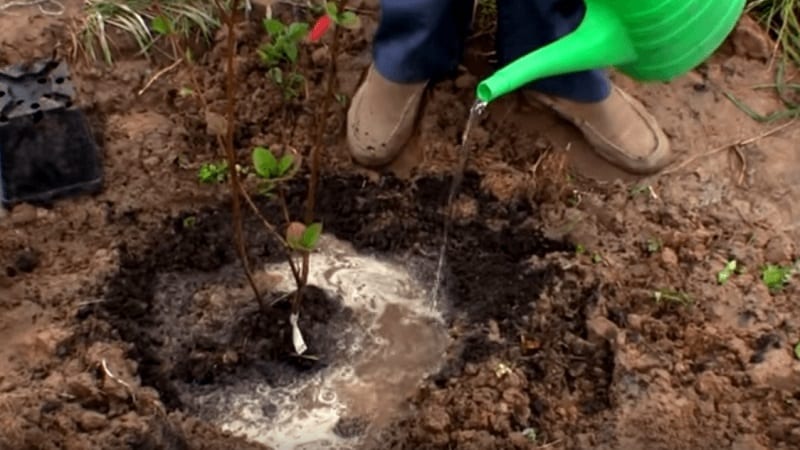
In the first 2-3 weeks after planting, seedlings are watered generously with water at room temperature.. This is done in grooves dug at a distance of 20 cm from the plant. One young rowan requires about 8 liters of water. If it rains often, the amount of moisture is reduced.
Attention! Rowan is fertilized only from the third year of life. At first, the plant needs complex fertilizers, which are placed in the hole when planting.
In the first year, it is important to carry out preventive measures to protect the crop from diseases and pests. Common insects - aphids, midges, sawflies, common diseases - anthracnose, gray and white spots, scab. For spring treatment, Oxychom or Abiga-Pik products are used. Contact fungicides are designed to combat viral and fungal diseases and pests.
Tips and tricks
To grow beautiful and productive rowan trees, experienced gardeners advise following simple planting and care recommendations.Although the plant tolerates moisture well, it is not recommended to plant it in swampy areas or near a pond. The best place is a hilly area in the sun or partial shade.
It is important to choose healthy seedlings with a branched root system for growing. If their appearance indicates that the plant is sick, such planting material will not make a beautiful tree.
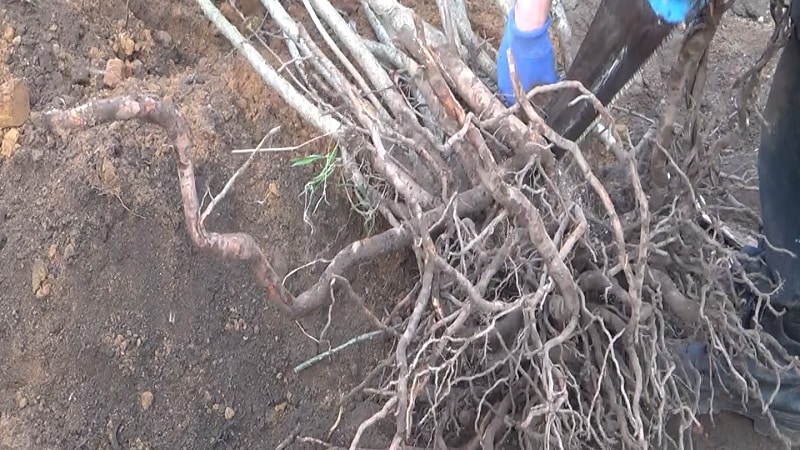
Some gardeners make a mistake: after planting, water the plant with cold water from a pond. This can lead to disease, so only water that has been settled and heated in the sun is used for irrigation. Many people immediately begin to fertilize rowan with mineral or organic fertilizers - it is important to remember that in the first 3 years of its life the tree does not need them.
Read also:
Step-by-step instructions on how to plant raspberries in spring
Conclusion
To plant rowan in the spring, choose a sunny and dry day. The step-by-step guide looks like this: prepare the seedlings and soil, place the plants in the hole, straighten the roots and cover with soil. The soil is first fertilized with mineral mixtures, otherwise the seedlings will take root poorly and subsequently give a poor harvest. Suitable neighbors for the crop are coniferous trees or shrubs, unsuitable neighbors are apple and pear trees. To speed up flowering and strengthen immunity, the plant is mulched and watered with warm water. Rowan is fertilized only in the third year after planting.